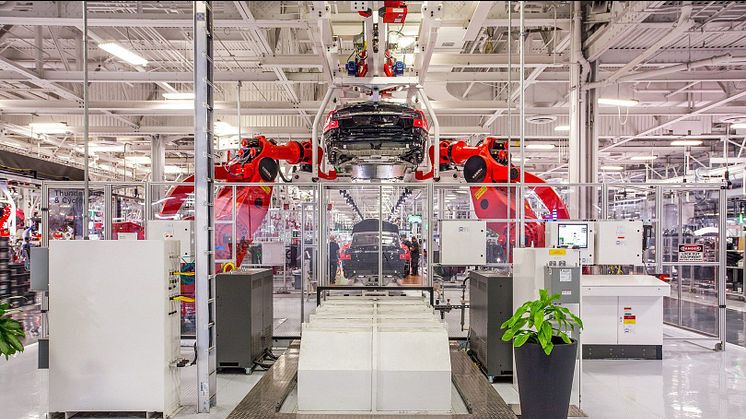
Blog post -
Digitalisation and the Nordic Opportunity
Everybody talks about the digitalisation, but what is it? We take a look at digitalisation, how it can be understood and the Nordic opportunity.
According to Gartner’s IT-glossary, digitalisation is “the use of digital technologies to change a business model and provide new revenue and value-producing opportunities”; it is the process of moving to a digital business. The Business Dictionary explains that“digitalisation is the integrationofdigitaltechnologiesinto everyday life by thedigitisationof everything that can be digitised”. Everything is a key word in this context.
In his groundbreaking book from 1995, Being Digital, Nicholas Negroponte, the founder of MIT Media Lab, writes aboutbitsandatomsand how they differ. Physical objects such as CDs and books are made of atoms. Digital information is made up of bits which essentially are strings of ones and zeros. To summarise, Negroponte argued that analogue information made of atoms (books, CDs, etc.) will eventually be made into bits. In short, everything that can be digital will eventually be digital. Think about that for a while, and you’ll get a hint of the possibilities of digitalisation. Add to that the idea that digital goods have virtually no reproduction cost. With every innovation, possibilities multiply. Today, we are getting used to the fact that much more than just media like CDs and newspapers are digitised, for example self-driving cars, clothes, assistants and our own DNA.
As consumers, we are aware of digitalisation in all its form. Online banking, music streaming, e-commerce, messaging and helpful bots are just a few examples. However we would argue that the a bigger and much more silent revolution is happening within enterprises.
For a few years now, we have looked at exciting growth companies in the Nordics. Almost 50% of these companies are “enterprise” companies, i.e. they sell products, services and solutions to other companies. Of these, most are enterprise software companies, providing usually cloud based software solving various parts of a company’s needs, for example payments, billing, logistics, security, HR processes, or analysing big data for customer intelligence.
To understand digitalisation of business, think of every time a company implements a software, tool or system to better run something that was previously done in a manual way. The sum of all these digital implementations is in the aggregate “digitalisation”. We believe that the Nordic countries are extremely well positioned to develop enterprise software that drive the digitalisation of business, based on robust IT infrastructure, mobile and broadband penetration. And also a long tradition of world-class product development for international markets. We see hundreds of exciting companies in this space, ranging from established well-known innovators like Qlik, MySQL and Axis to newer companies like DigiExam and Kahoot that digitalise education, 3D-printing company Arcam and Finland’s information management software M-Files, just to name a few.
One of the most dramatic areas is digitalisation of manufacturing. As industrial conglomerate Siemens puts it:“The Internet enables firms to collaborate more closely with partners, address customers, establish new business processes and, above all, manufacture products more efficiently through virtual 3D development, digital planning and monitoring, and nearly error-free production. This transformation into a new industrial era is called Industrie 4.0 in Germany. At the end it simply refers to the complete digital representation of a company’s entire value chain.”
Intelligent manufacturing is driving growth and digitalisation, as Tesla has shown with its new manufacturing plant in Fremont, California (pictured above). There are now already many Californian companies, mostly from Silicon Valley, that supply Tesla, supporting smart production of electric cars. This is a strong and multi-dimensional case of digitalisation, since it involves both digitalisation of a traditional product (the car), the manufacturing processing (the car factory) and and wider ecosystem that supply new software and other products to Tesla, creating a strong local industry cluster. In the same way, back in the Nordics, our industrial giants (think for example Volvo, Wärtsilä and ABB) play a role in creating local Nordic clusters of innovative suppliers that enables digitalisation.
We also see a growing number of what we would call “digitalisation consultants” helping their clients to implement enterprise resource planning systems, business intelligence, online marketing tools, e-commerce platforms and other tools to digitalise their clients’ businesses, value chains and operational tasks.
The Swedish government launched The Digitalisation Commission in 2012 to support the ICT-policy goal that Sweden should be the best in the world at exploiting the opportunities of digitalisation. In their latest report, about a data-driven society, shows how the focus now has shifted from infrastructure (we all have broadband now, right) to managing large amounts of data in education, welfare, healthcare and business. Expect to hear more politicians talking about algorithms. The Nordic countries have a long experience of running modern welfare states, and the digitalisation of society’s various functions is just as strong as the digitalisation of business.
In consumer services like streaming video (YouTube), social networks (Instagram) and messaging (WhatsApp) it’s hard for a Nordic company to compete with Silicon Valley. However, in enterprise software, with companies competing in global niche markets like video analytics, 3D optimization and big data processing we are at the very forefront and have the potential to build international winners from a local Nordic base. Standout’s mission is to help these companies to succeed.
At Standout, we decided early on that our overall thesis is to invest in the digitalisation of business and society. This is a mega trend that is sure to continue for a many decades making our strategy long term. Digitalisation will continue to create new growth and value, and thereby shift fortunes to both new and established companies (and their owners) that have figured out a winning strategy. We also think that the Nordics is an especially well-positioned region to reap the benefits from digitalisation.
Originally published at Standout Capital

